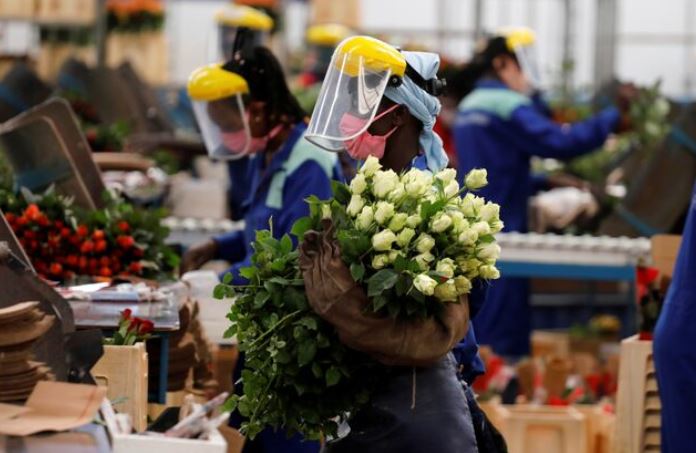New Bill proposes mandatory licensing for horticulture dealers in Kenya

The 2024 Horticultural Crops Authority Bill aims to streamline the horticultural sector by mandating county governments to maintain a registry of marketing agents, nursery dealers, planting material propagators and mother block operators operating in the domestic market.
Horticultural dealers in Kenya will soon need licenses to cultivate, handle, and sell fruits, vegetables, and flowers under a new legislative proposal.
The 2024 Horticultural Crops Authority Bill, introduced by nominated MP Sabina Chege, aims to streamline the horticultural sector by mandating county governments to maintain a registry of marketing agents, nursery dealers, planting material propagators and mother block operators operating in the domestic market.
More To Read
- Chilli farming transforms Kilifi economy as new processing plant boosts jobs and incomes
- Kenya's flower exports to hit Sh110 billion in 2025 amid growing demand
- Kenya introduces new system to track horticultural exports
- Stoppage of USAID funding threatens to ruin agriculture programmes in Kenya
- Improved tea, flower exports cuts Kenya’s trade deficit by Sh23bn
- Domestic earnings up by 19.5%, surge attributed to increase in tea, horticultural exports
“The principal objective of this Bill is to provide for the regulation of the production, post-harvest handling, marketing and processing of horticultural crops, to provide for the development and promotion of horticultural crops and to provide for the establishment, functions and powers of the Horticultural Crops Authority,” reads the Bill.
The Bill has proposed the establishment of a Horticultural Crops Authority which shall be mandated in issuing the licences. In the Bill, Chege proposes that the headquarters of the Authority be stationed at Nairobi City County.
“The Authority may establish such branches in Kenya as it may consider necessary for the efficient performance of its functions,” reads the Bill.
According to the Bill, the Authority shall be mandated with various tasks including issuing of licences with regard to horticultural produce and products. The licences will include; export licence, an import licence to importers and a processor license for exports.
The Bill stipulates that a person shall not process, import or export horticultural produce or product unless that person is licensed by the Authority.
“The Cabinet Secretary shall prescribe regulations providing for the procedure for licensing under this section and the appeal process in case of refusal or denial of licence. A licence issued under this section shall remain in force from the first of July until the thirtieth of June of the following year unless earlier cancelled,” reads the Bill.
The Bill also warns that a person who contravenes the requirements or commits an offence and shall upon conviction be liable to a fine not exceeding Sh2 million or to imprisonment for term not exceeding three years or to both.
Chege has also proposed that a person shall not process horticultural produce for local trade unless that person is licensed by the respective county government.
The licence issued by county governments shall also remain in force from first of July until the thirtieth of June of the following year unless earlier cancelled.
“A person who contravenes sub-section (1) commits an offence and shall upon conviction be liable to a fine not exceeding two million shillings or to imprisonment for term not exceeding three years or to both. An application for the renewal of a licence shall be made to the Authority or respective county government not later than the first day of March in which the current licence is due to expire,” reads the Bill.
Mandatory registration
The Bill also seeks to regulate dealers further by stipulating that no one will be permitted to engage in the horticultural trade unless they are registered by the Horticultural Crops Authority or the county government.
This registration process will cover a range of participants in both domestic and export markets, including marketing agents, nursery operators, mother block operators, ship handlers, and horticulture associations.
The Authority and county governments will maintain lists of these registered dealers, and only those who fulfil the necessary conditions will receive certificates of registration.
According to the Bill, a certificate will remain valid for one year, running from July 1 to June 30, unless it is revoked earlier. Violators of these provisions risk facing a fine of up to Sh1 million or a maximum prison sentence of three years, or both.
In addition, the Bill mandates that commercial horticultural growers must be registered free of charge by their respective county governments. This is aimed at improving data collection, production planning, marketing, and ensuring traceability of products for quality assurance. The Bill also makes it illegal to pack, process, or store horticultural produce in unlicensed premises, with offenders facing similar penalties of up to Sh1 million or a maximum three-year imprisonment.
The legislation emphasises the use of certified inputs from registered sources for horticultural growers. It also tasks the Horticultural Crops Authority with monitoring compliance with national certification standards to ensure produce meets the quality requirements of both regional and international markets.
Additionally, flower growers will be required to adhere to sustainable practices, including environmental conservation and worker welfare, as per guidelines developed by the Authority based on agroecological zones.
Furthermore, the Bill empowers the Cabinet Secretary to impose a levy on horticultural exports and imports, referred to as the horticultural crops levy.
Exporters will be charged a levy of 0.5 per cent on the free-on-board value of horticultural produce, excluding processed products, while importers will face a four per cent levy on finished horticultural products and a two per cent levy on fresh produce imports.
Failure to pay the levies will be considered a criminal offense.
Horticulture is a major contributor to Kenya's foreign exchange earnings, alongside tourism, tea, and remittances. Data from the Central Bank of Kenya (CBK) indicates that between January and April 2024, the country's exports of vegetables, nuts, fruits, and cut flowers rose by 15 per cent.
According to CBK statistics, horticulture earnings increased to Sh46.9 billion in the first four months of the year, compared to Sh40.7 billion during the same period last year.
Top Stories Today










































